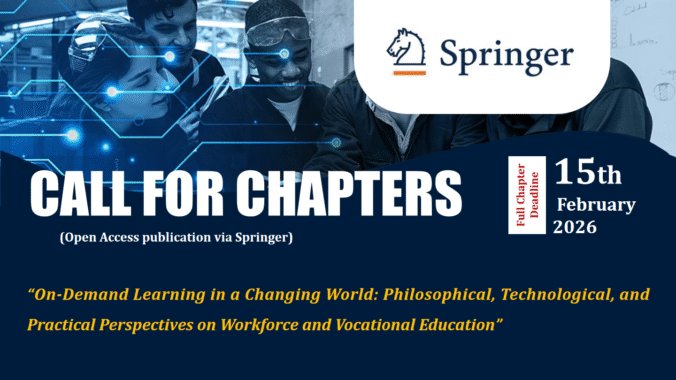On-Demand Learning in a Changing World: Philosophical, Technological, and Practical Perspectives on Workforce and Vocational Education
(Open Access publication via Springer)
Editor(s): Dejian Liu, Paul Prinsloo, Asha Kanwar, Usama Kalim, Yifan Zhang
- For comprehensive background, scope, and suggested topics, access the complete concept note: http://iasle.net/concept-note/ or kindly download On-Demand Learning in a Changing World-Concept Note
- All proposals must follow the guidelines found on http://iasle.net/proposal-submission-guidelines/
- All papers must be submitted via the EasyChair: https://easychair.org/my/conference?conf=ondemandlearninginac0
Background
The world is experiencing unprecedented transformation in how knowledge is produced, shared, and legitimized. On-Demand Learning has emerged as a critical paradigm—moving beyond convenience to fundamentally reorganize relationships between knowledge, learners, and work. This shift responds to rapidly changing workplaces, accelerated technological innovation (including GenAI), and demands for flexible, modular, skill-aligned pathways.
Why This Book Now?
Global education systems face unprecedented pressure from AI, automation, and shifting labor markets, demanding adaptable, just-in-time learning solutions. Governments and industries now prioritize lifelong learning for competitiveness and inclusion.
International bodies (UNESCO, OECD, World Bank) advocate flexible, equitable education aligning with Sustainable Development Goal 4. Meanwhile, micro-credentials and modular pathways offer accessible upskilling but raise critical equity and quality concerns—particularly in the Global South.
The 2023 GenAI surge further intensifies this urgency, blurring boundaries between human/machine learning and formal/informal knowledge. These technologies redefine agency while exposing ethical tensions in on-demand education.
This volume addresses the imperative to critically reimagine on-demand learning as a flexible, equitable paradigm for sustainable educational futures amid rapid technological and socioeconomic change.
Aims and Objectives
The book aims to explore the foundations, challenges, and practices of On-Demand Learning for vocational, skill-centric, and inclusive workforce development, mainly including:
- Critically examine the philosophical, political, economic, social, technological, pedagogical and psychological assumptions and principles that underpin our understanding of On-Demand Learning, with particular attention to the changing landscape of work, vocational education and workforce development.
- Explore the linkages, tensions, potential and future of On-Demand Learning with formal and/or professional qualifications and forms of delivery;
- Consider the epistemological and ontological assumptions and principles that guide lifelong, skill-centric, career-focused applications of On-Demand Learning;
- Highlight technology-enabled practices (e.g., AI, mobile, micro-credentialing) that support flexible, modular, and learner-driven pathways aligned with societal, workplace and industry needs;
- Examine implementation challenges, including accreditation, quality assurance, equity of access, and regulatory and institutional readiness, across both formal and informal education and training systems;
- Explore under what conditions On-Demand Learning serves inclusion, social justice, and equitable opportunities in/for resource-constrained environments and/or for vulnerable, marginalised individuals and communities.
Excluded from scope
This book will focus specifically on On-Demand Learning as a distinct approach to skill-centric, context-driven, and outcome-aligned education. The following falls outside the aims and scope of this book:
- General online, blended and hybrid forms of learning that form part of academic/professional degree programs;
- Research on (traditional) Massive Open Online Courses
- Research on the use of GenAI in online, blended and hybrid forms of learning that form part of academic/professional degree programs
By drawing these boundaries, the book situates itself as a critical and forward-looking exploration of On-Demand Learning in contexts where flexibility, responsiveness, and industry relevance are key drivers.
Review Process
The submitted book chapters would be reviewed under double-blind review process by external experts and other chapter authors. By submitting the book chapter, we kindly request authors to act as peer reviewers.
Important Dates
Proposal Submission Deadline: October 22, 2025 October 29, 2025Notification of Acceptance: November 15, 2025- Full Chapter Submission: February 15, 2026
- Peer Review Feedback: March 30, 2026
- Final Chapter Revisions Due: April 30, 2026
- Publication (Expected): Late 2026 (Print and SpringerLink)
For inquiries, please contact Dr. Usama Kalim (Co-Editor) at ukalim94@gmail.com

Leave a Reply
You must be logged in to post a comment.